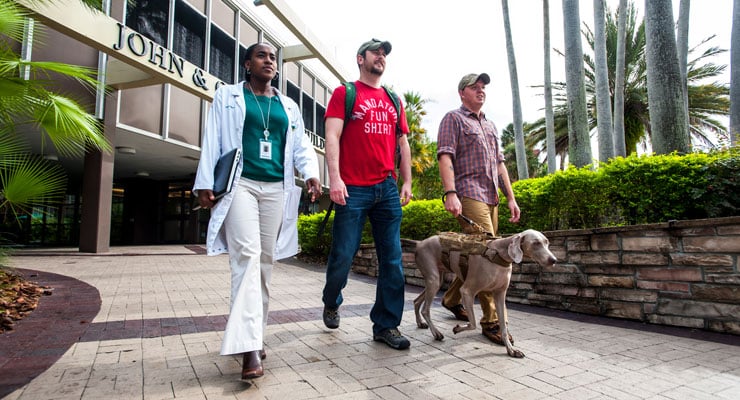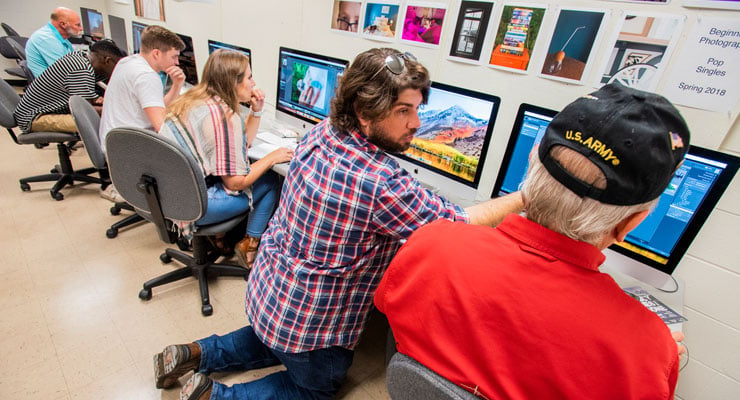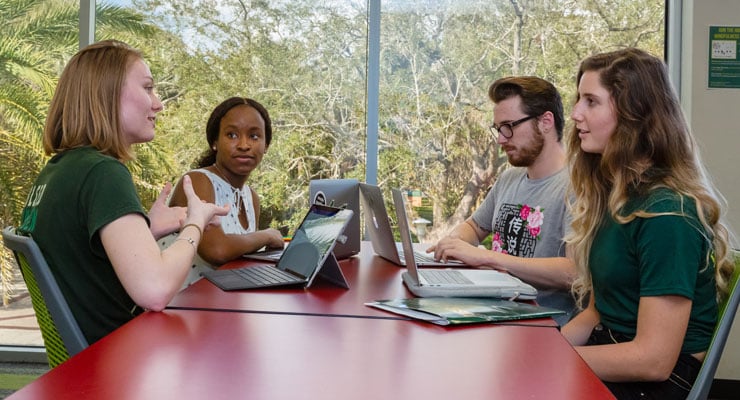
If you’re among the 0.4 percent of Americans active in the armed forces, the 7 percent who have served, or the 39 percent of troops since World War II who reported serving in combat or a war zone, you deserve more than a “thanks for your service.” As we observed this year's Veterans Day, a lot of thank-you’s were heard and seen. Gratitude is appreciated, but not as much as high-quality medical care and education. Both were promised. The Post-911 GI Bill reinvigorated the promise of an education, and a lot of schools are stepping up. Our look at what makes a college military friendly focuses on those actions, not words.
It’s Not the ‘Fancy Logos or Catchy Ads’
According to a Department of Veterans Affairs story under the headline “What Exactly Is a ‘Military-Friendly’ School,” veterans should forget about “fancy logos or catchy ads” when evaluating a school. Army Capt. Robert Prah says focus on answers to questions such as these:
- Is there a center for veterans on campus?
- How many veterans are enrolled in the school?
- What’s the policy on turning military credits and training into college credits?
- Is there priority scheduling for veterans?
- What happens if I have to deploy or mobilize?
Military Times magazine has a good answer for the question Prah’s story asks. The magazine does Best for Vets rankings, including one of veteran-friendly colleges. Its methodology for ranking military-friendly schools is to assess, in order of importance, “university culture, student support, academic policies, academic outcomes/quality, and cost and financial aid.”
An American Council on Education (ACE) paper titled “Toolkit for Veteran Friendly Institutions” concisely lists what it deems necessary for a school to be military friendly. This includes programs, services, and campus culture; policies; and resources – closely tracking the parameters Military Times uses in its college rankings.
Here’s a shallow dive on each of ACE’s categories and the actions/services they entail:
Programs, Services, and Campus Culture
ACE cites a need for:
- Successful programs:
- Deliver top-down support, from provosts and presidents to instructors’ aides.
- Create a central point of contact, which can be a VA certifying official but also is embodied in a central website and/or physical gathering place where veterans and others who have served or are serving can get assistance and engage with peers.
- Pursue awareness of students who have a military résumé. You can’t work to ensure they succeed if they stay in the shadows, and many do.
- Welcome and support student veteran organizations.
- Academic support:
- Provide veteran-specific orientation.
- Ensure staff and faculty are trained to understand and address the needs of military personnel.
- Create and maintain lines of communication.
- Vie for academic success through services such as tutoring.
- Provide veteran-specific courses through which issues such as transitioning to civilian life, leveraging benefits, and dealing with disabilities can be addressed.
- Inclusive campus culture:
- Help students acclimate and feel like they are part of the social fabric of the campus.
- ACE says “getting the word out that student veterans are not only welcomed and appreciated, but also accommodated on campus is a great first step.”
- Recognize that these students typically are older and have different housing needs. Meeting those needs is crucial to success.
From there, the ACE toolkit gets even more granular, digging into policies and resources, from applying policies and providing specific student services to funding institutional programs to delivering financial aid, housing, and disability services.
A School Might Be Military Friendly If….
MilitaryBenefits.info offers a military-friendly colleges guide that’s a long list of specific benefits and actions. Those entitled to these perks includes “Veterans, Active-duty service members, Reservists, Guardsmen, spouses and dependents of disabled or deceased veterans in any of the five branches of the U.S. Armed Forces.
If a school can put a check mark next to many or all of the following items, it’s on its way to being military friendly:
- Host a Student Veterans of America chapter.
- Have a full-time, on-campus counselor for veterans.
- Sign and adhere to VA Principles of Excellence.
- Embrace and execute on the 8 Keys to Veterans’ Success.
- Accept College-Level Examination Program and Defense Subject Standardized Test transfer credits.
- Charge active-duty military personnel the in-state tuition rate – or less.
- Embrace the Yellow Ribbon Reintegration Program.
- Provide and facilitate scholarships.
USF Checks the Boxes on Being Military Friendly
USF strives to meet the needs of those who served or are serving in the armed forces. Here are two measures of success:
- Military Times ranked USF No. 4 among four-year schools in its Best for Vets: College 2020 assessment.
- U.S. News & World Report ranked USF among the top 100 schools in its 2020 Best Colleges for Veterans ranking.
The ultimate measure of success is the graduation rate, and USF has a system designed to successfully transition these students from campus to career. Tools such as the Academic Success Center are available to everyone, but veterans’ needs deserve tailored solutions. USF recognizes that and steps up, particularly the Office of Veteran Success. Its programs and services include:
- On-campus liaison with the VA and USF departments to help students navigate the university system
- Guidance on benefits eligibility and help with VA/USF paperwork
- Veteran Mentoring Program and a Veterans Academic Enhancement Program
- A Got Your Six program to educate faculty about the needs and special circumstances of veterans
- Scholarship opportunities through the Pat Tillman Foundation Military Scholarship Program
- Programs and services for students with post-traumatic stress disorder, traumatic brain injury, and/or other military-specific conditions
- Events and programs to connect the students to the campus community
- Two veteran-only, three-credit, upper-level elective courses to support the transition from the military to the classroom to the post-service career
There are a lot of questions specific to veterans and college admissions. If you’re in the process of choosing the college that’s right for you, contact USF's Office of Veteran Success.




